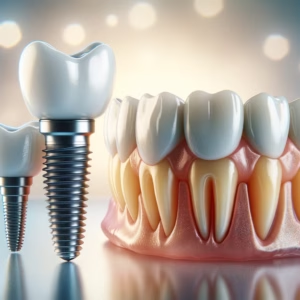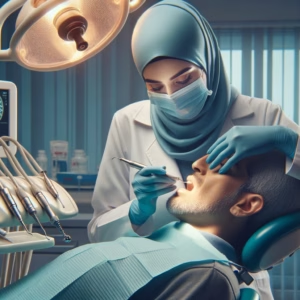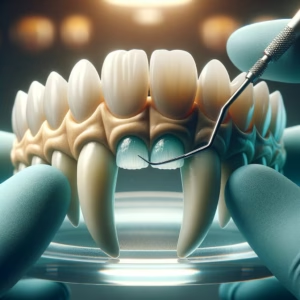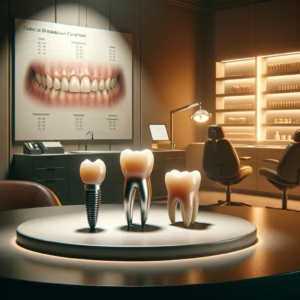Understanding Tooth Replacement Options
Tooth loss can significantly impact an individual’s oral health, self-esteem, and overall quality of life. Fortunately, there are several effective tooth replacement options available for adults, each with its unique benefits and considerations. In Ashburn, VA, patients have access to a variety of treatments that can restore their smiles and functionality. This section introduces three primary tooth replacement options: dental implants, bridges, and dentures.
1. Dental Implants
Dental implants are considered the gold standard in tooth replacement. This option involves surgically placing a titanium post into the jawbone, which acts as a root for the artificial tooth (crown). Over time, the implant fuses with the bone in a process called osseointegration, providing a stable and durable foundation for the replacement tooth.
Benefits:
- Natural Appearance and Function: Implants closely mimic the look and function of natural teeth.
- Longevity: With proper care, dental implants can last a lifetime.
- Bone Preservation: Implants stimulate the jawbone, preventing bone loss that typically occurs after tooth loss.
- No Impact on Adjacent Teeth: Unlike bridges, implants do not require alteration of neighboring teeth.
Considerations:
- Surgical Procedure: The placement of implants requires a surgical procedure and may involve a longer recovery time.
- Cost: Implants tend to be more expensive upfront than other options, though they may be more cost-effective in the long run due to their longevity.
2. Dental Bridges
A dental bridge is a fixed prosthetic device used to replace one or more missing teeth. It consists of one or more artificial teeth (pontics) anchored to adjacent natural teeth or implants, effectively “bridging” the gap.
Benefits:
- Quick Solution: Bridges can often be completed in a few dental visits, making them a quicker option compared to implants.
- Improved Aesthetics: Bridges restore the appearance of your smile and improve speech and chewing function.
- Cost-Effective: Generally, bridges are less expensive than implants and may be covered by dental insurance.
Considerations:
- Impact on Adjacent Teeth: Placing a bridge requires the alteration of neighboring teeth to support the prosthetic.
- Longevity: While bridges can last several years, they typically require replacement or repair over time.
3. Dentures
Dentures are removable prosthetic devices that replace missing teeth and surrounding tissues. They can be complete (replacing all teeth) or partial (replacing some teeth) and are made from acrylic resin, sometimes combined with metal for added strength.
Benefits:
- Affordability: Dentures are generally the most economical option for tooth replacement.
- Non-Invasive: The process of obtaining dentures does not require surgery, making it suitable for those who may not be candidates for surgical options.
- Quick Turnaround: Many dental practices can provide immediate dentures, which can be placed right after tooth extraction.
Considerations:
- Adjustability: Dentures may require adjustments over time for comfort and fit as the mouth changes.
- Maintenance: Patients may need to remove and clean dentures daily, and some people experience difficulties with eating and speaking.
Conclusion
In Ashburn, VA, adults seeking tooth replacement options have multiple choices, each with its unique advantages and disadvantages. Understanding these options—dental implants, bridges, and dentures—serves as the first step toward achieving a restored smile and improved oral health. As we explore each option further, it’s essential to consider personal preferences, lifestyle, and budget to make an informed decision that best suits individual needs.
Dental Implants Explained
1. Dental Implants
The process of obtaining dental implants generally involves several key steps, starting with an initial consultation and assessment by a dental professional. This first step is crucial to determine the health of the jawbone and the overall suitability for implants.
Surgical Procedure:
- Preparation and Planning: After a thorough examination, imaging studies like X-rays or a CT scan are performed to assess the jawbone structure and plan the implant placement accurately.
- Implant Placement: The surgical procedure begins with administering local anesthesia or sedation to ensure patient comfort. The dentist then makes an incision in the gum to expose the jawbone, where the titanium post (implant) will be inserted. This post serves as the artificial root of the tooth and is positioned into the bone, typically below the gum line.
- Osseointegration: Following the placement, a healing period of several months is necessary for osseointegration to occur. During this time, the jawbone gradually grows around the implant, anchoring it securely and providing a stable foundation for the crown.
- Abutment Placement: Once osseointegration is complete, a small procedure is performed to attach an abutment to the implant. This piece connects the implant to the crown and may require another healing period.
- Crown Placement: Finally, the custom-made crown, designed to match the surrounding teeth, is securely placed on the abutment. Adjustments are made to ensure a comfortable fit and proper bite alignment.
Healing Time:
The entire process from implant placement to crown placement can take several months, primarily due to the osseointegration phase, which typically lasts anywhere from 3 to 6 months. Each patient’s healing time may vary based on individual health factors, with some patients requiring additional procedures, such as bone grafting, if there is insufficient bone density.
Natural Teeth Emulation:
Dental implants closely emulate natural teeth in both appearance and function. The titanium post acts as a root, providing stability, while the crown is custom-crafted to blend seamlessly with the existing teeth. Implants restore the ability to chew effectively and speak clearly, enhancing overall oral function. Additionally, because they stimulate the jawbone, implants help maintain facial structure, preventing the sunken appearance that often accompanies tooth loss.
Reasons for Popularity in Ashburn, VA:
The increasing popularity of dental implants in Ashburn, VA, among adults seeking long-term tooth replacement solutions can be attributed to several factors:
- Durability and Longevity: As a long-term solution, dental implants can last a lifetime with proper care, making them a worthwhile investment for those looking for permanent options.
- Advanced Technology: The availability of advanced dental technologies and materials in Ashburn enhances the efficacy and comfort of the procedure, attracting more patients.
- Increased Awareness: Growing awareness about the health benefits of dental implants, including bone preservation and the prevention of further dental issues, encourages more individuals to consider them as a viable option.
- Aesthetic Benefits: The natural appearance of implants appeals to many adults, as they provide a cosmetic solution that restores confidence and improves quality of life.
- Minimal Maintenance: Unlike dentures or bridges, dental implants require similar care to natural teeth, making them easier to maintain in the long run.
As more adults in Ashburn, VA recognize these advantages, dental implants continue to gain traction as a preferred choice for restoring smiles and oral function.
Fixed Bridges
2. Dental Bridges
A dental bridge is a fixed prosthetic device used to replace one or more missing teeth. It consists of one or more artificial teeth (pontics) anchored to adjacent natural teeth or implants, effectively “bridging” the gap.
Functionality:
- Anchoring: Bridges rely on the strength of adjacent teeth, known as abutment teeth, which are prepared to support the bridge. This can restore functionality in chewing and speaking.
- Stability: Once placed, bridges do not move, making them a dependable choice for patients who want a permanent solution to tooth loss.
Longevity:
- Durability: With proper care, dental bridges can last anywhere from 5 to 15 years. Regular dental check-ups and good oral hygiene practices are critical for maintaining the integrity of the bridge and supporting teeth.
- Replacement Needs: Over time, bridges may need to be replaced or repaired, especially if the supporting teeth experience decay or other issues.
Situational Appropriateness:
- Ideal Candidates: Bridges are suitable for patients with healthy adjacent teeth that can support the bridge. They may be recommended for those who are not candidates for implants due to medical conditions or insufficient bone density.
- Quick Solution: For individuals seeking a relatively quick tooth replacement option, bridges can often be completed in a few dental visits, making them a convenient choice.
Comparison to Dental Implants:
- Accessibility: Dental bridges may be more accessible for patients who prefer a non-surgical option. The process is less invasive than dental implants, which require surgery and a healing period.
- Cost in Ashburn, VA: Generally, bridges are less expensive than implants, making them a cost-effective solution for many patients. While dental insurance may cover a significant portion of bridge costs, implants often have higher out-of-pocket expenses despite their potential for long-term savings due to durability.
In summary, dental bridges offer a reliable and less invasive alternative for tooth replacement, making them an appropriate choice for many individuals, especially those who prioritize convenience and immediate results. However, when considering longevity and overall health benefits, dental implants may still be a preferable option for others.
Partial and Complete Dentures
3. Dentures (Continued)
When considering dentures, it’s crucial to recognize the differences between partial and complete dentures based on the number of teeth lost.
Partial Dentures
Partial dentures are designed for individuals who have lost some, but not all, of their natural teeth. They consist of a gum-colored base that supports one or more artificial teeth. The partial denture is held in place using metal clasps or precision attachments that connect to remaining natural teeth.
Benefits:
- Preservation of Remaining Teeth: Partial dentures help prevent remaining teeth from shifting into the gaps left by missing teeth.
- Customization: They can be tailored to match the color, size, and shape of existing teeth, providing a seamless look.
- Enhanced Functionality: Partial dentures improve chewing and speaking capabilities, making daily activities easier.
Considerations:
- Fit and Comfort: Proper fit is essential for comfort; adjustments may be needed as the mouth changes over time.
- Daily Maintenance: Similar to complete dentures, partials require daily cleaning and specific care to maintain their condition.
Complete Dentures
Complete dentures are suitable for individuals who have lost all their teeth in one or both arches (upper or lower jaw). They provide a full set of teeth, restoring functionality and aesthetics.
Benefits:
- Restoration of Smile: Complete dentures enhance facial appearance by providing support to the lips and cheeks, reducing sagging.
- Improved Quality of Life: They allow individuals to eat a broader range of foods and speak more clearly.
Considerations:
- Adjustment Period: It can take time to adapt to wearing complete dentures, and initial discomfort is common.
- Potential for Slippage: Complete dentures may shift during eating or speaking, which can be mitigated with adhesive products or implant-supported dentures.
Customization Process
The customization process for dentures is vital to ensure optimal fit, comfort, and aesthetics. This typically involves several steps:
- Consultation: A thorough examination and discussion of the patient’s needs, preferences, and lifestyle.
- Impressions: Dental professionals take impressions of the mouth to create a model for the dentures.
- Trial Fitting: Patients may receive a wax or plastic version of the dentures to assess fit, comfort, and appearance before final fabrication.
- Final Adjustments: Once the dentures are completed, patients may need follow-up visits for adjustments to ensure a comfortable fit.
Comfort Considerations
Comfort is crucial when wearing dentures, as ill-fitting dentures can lead to irritation, sore spots, and difficulty eating or speaking. Patients should be proactive in reporting any discomfort to their dental provider for timely adjustments. Over time, the mouth may change, affecting the fit of the dentures, necessitating further adjustments or relining.
Maintenance Considerations
Proper maintenance of dentures is essential for their longevity and functionality:
- Daily Cleaning: Dentures should be removed and cleaned daily using a soft brush and non-abrasive cleaner. Avoid using toothpaste, as it can be too harsh.
- Soaking: Consider soaking dentures in a denture cleanser overnight to keep them moist and prevent warping.
- Regular Check-ups: Regular dental visits are important for monitoring the fit of the dentures and addressing any oral health concerns.
Residents of Ashburn, VA considering dentures should weigh the advantages and challenges of partial and complete options, keeping in mind the customization process, comfort, and maintenance requirements to ensure a successful transition to new dentures.
Costs of Tooth Replacement in Ashburn
When considering tooth replacement options in Ashburn, VA, it’s crucial to evaluate the associated costs, including consultation fees, insurance coverage, and potential financing plans. Below is a breakdown of the financial aspects for the three primary tooth replacement options.
1. Dental Implants
Initial Costs:
- Consultation Fees: Initial consultations typically range from $100 to $300, depending on the dental practice.
- Implant Placement: The cost for a single dental implant can range from $3,000 to $4,500, including the titanium post, abutment, and crown.
- Additional Procedures: Patients may incur extra costs for preliminary procedures such as bone grafts or sinus lifts, ranging from $500 to $3,000.
Insurance Coverage:
- Many dental insurance plans provide limited coverage for implants, often covering 10-50% of the total cost. Patients are encouraged to check their specific policy details.
Financing Plans:
- Dental practices may offer in-house financing options or work with third-party financing companies. Monthly payment plans can vary widely but typically fall between $100 and $300 per month, depending on the total amount financed and the repayment term.
2. Dental Bridges
Initial Costs:
- Consultation Fees: Similar to implants, the initial consultation costs range from $100 to $300.
- Bridge Placement: The estimated cost for a dental bridge can range from $2,000 to $5,000, depending on the number of teeth replaced and materials used. Traditional bridges are generally less expensive than those supported by implants.
Insurance Coverage:
- Dental bridges are more commonly covered by insurance, with many plans covering 50-80% of the total cost, making them a more affordable option for many patients.
Financing Plans:
- Similar to dental implants, financing options are available through dental practices and third-party companies, with monthly payments typically ranging from $75 to $250.
3. Dentures
Initial Costs:
- Consultation Fees: The initial consultation for dentures also falls within the $100 to $300 range.
- Complete Dentures: The average cost for complete dentures ranges from $1,500 to $3,500, while partial dentures can cost between $700 and $2,000.
- Adjustment Fees: Patients may need to budget for potential adjustment fees, which can range from $50 to $200 per visit.
Insurance Coverage:
- Many insurance plans cover a significant portion of denture costs, often ranging from 50-80%. However, coverage can vary based on the type of denture and the specific policy.
Financing Plans:
- Financing options are widely available for dentures, with monthly payments typically ranging from $50 to $150, depending on the total cost and financing terms.
Summary of Costs
Tooth Replacement Option | Initial Costs (Approx.) | Insurance Coverage | Financing Options |
Dental Implants | $3,000 – $4,500+ | 10-50% coverage | $100 – $300/month |
Dental Bridges | $2,000 – $5,000 | 50-80% coverage | $75 – $250/month |
Dentures | $1,500 – $3,500 | 50-80% coverage | $50 – $150/month |
In Ashburn, VA, understanding the financial implications of each tooth replacement option is essential for making an informed decision. Factors such as initial costs, insurance coverage, and financing plans play a significant role in determining the best choice based on individual circumstances.
Choosing the Right Dental Professional
When it comes to tooth replacement procedures, selecting the right dental professional in Ashburn, VA, is crucial for achieving the best oral health outcomes. This decision can significantly impact not only the success of the procedure but also the overall experience and satisfaction with the results. Here are some key factors to consider when choosing a dental professional for tooth replacement:
- Reviews and Recommendations:
Patient reviews and testimonials can provide valuable insights into the quality of care and patient experiences at a dental practice. Look for professionals with consistently positive feedback regarding their skills in tooth replacement procedures. Online platforms, such as Google and Yelp, as well as recommendations from friends or family, can help you assess the reputation of various dental professionals in your area.
- Experience and Specialization:
It is important to consider the experience level of the dental professional you are considering. A dentist who specializes in restorative dentistry or has extensive experience with tooth replacement procedures, such as dental implants, bridges, or dentures, is likely to provide a higher level of care. Inquire about their educational background, training, and the number of similar procedures they have performed.
- Initial Consultations:
Scheduling consultations with potential dental professionals can provide an opportunity to ask questions, discuss treatment options, and assess their approach to patient care. During these consultations, pay attention to how comfortable you feel and whether the dentist takes the time to address your concerns. A good dental professional should explain the procedure in detail, outline the expected outcomes, and discuss any potential risks or complications.
- Treatment Options and Technology:
Consider whether the dental practice offers a range of tooth replacement options and utilizes the latest technology. Advanced techniques and tools can enhance the precision and effectiveness of procedures, leading to better outcomes. A practice that stays updated with developments in dental care is more likely to provide you with the best possible treatment.
- Financial Considerations:
Discussing financial aspects upfront can help you manage costs effectively. Inquire about payment options, insurance acceptance, and financing plans that may be available. Understanding the overall cost of the procedure, including any follow-up care, will help you make a well-informed decision.
Making an informed choice when selecting a dental professional for tooth replacement procedures is essential for achieving optimal oral health. By considering reviews, experience, and consultations, you can find a skilled and compassionate dentist who meets your needs and helps restore your smile with confidence.






